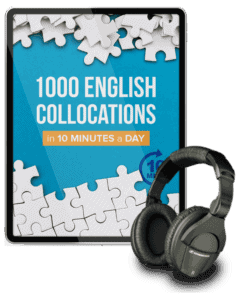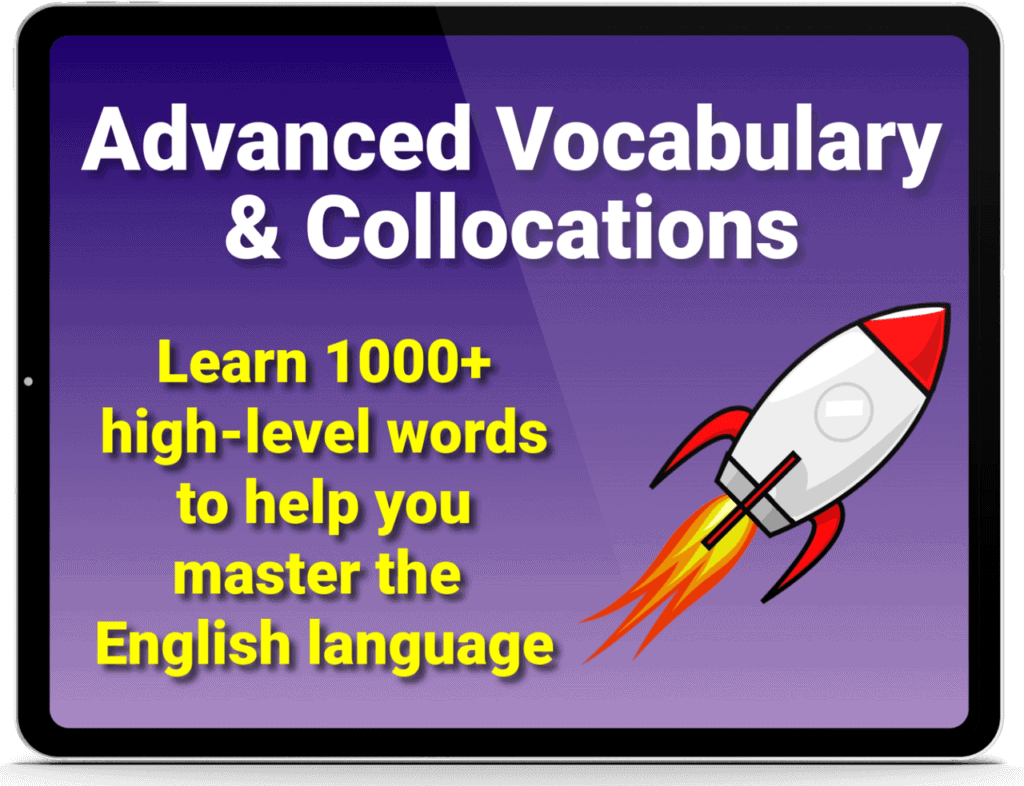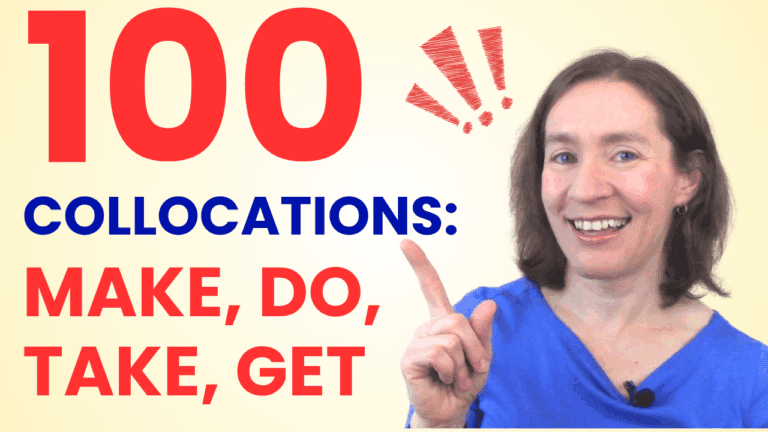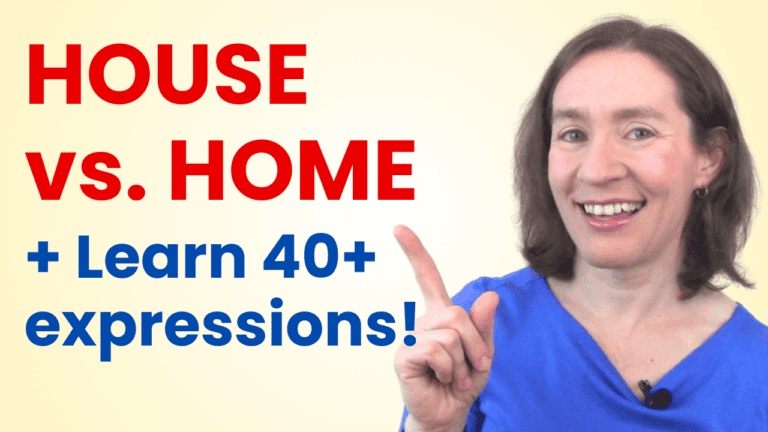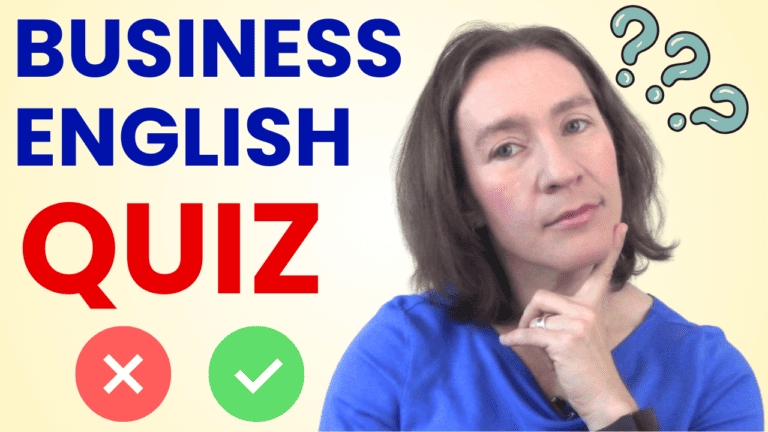
GET is one of the most common verbs in the English language – and we use it in a ton of different ways! It can be used for receiving things, for emotions, for changes, for relationships, for travel, and lots more.
Today you’ll learn 50 common English collocations with “get” — these are used often native English speakers. I’ve organized them by category, so they’re easier to remember and use in your own English. Make sure to download the lesson PDF to review them!
GET + ADJECTIVE
Our first category is using get + an adjective to describe a change of state, like “I’m getting tired” – this means I’m becoming tired.
Some other common ones are get ready, get angry, get cold, get sick, get nervous, get dark, get lost, and get hungry.
We also use get for changes in relationship status, like when two people get engaged (meaning they promise to marry each other), get married, and get divorced.
| COLLOCATION | EXAMPLE SENTENCE |
| get tired | It’s 10 PM, the kids are getting tired. |
| get ready | Hurry up – we need to get ready to leave. |
| get angry | The boss got angry when I made a mistake. |
| get cold | It gets cold here in the winter. |
| get sick | I got sick after drinking some expired milk. |
| get nervous | She always gets nervous before a test. |
| get dark | The sun has set and it’s getting dark. |
| get lost | We got lost in the unfamiliar city. |
| get hungry | I’m starting to get hungry – let’s eat. |
| get engaged | John and Sarah got engaged and are planning their wedding. |
| get married | They got married in June. |
| get divorced | He and his ex got divorced many years ago. |
GET + COMPARATIVE
Next we have get + a comparative adjective to describe how something changes over time – like get better or get worse.
My English lessons and courses help your English get better every day. He went to the doctor because his cough was getting worse – it was changing, it was becoming worse.
A few other common ones are get bigger, get smaller, get cheaper, or get more expensive, get easier, get harder – you can put any comparative adjective after “get” to show a change over time.
| COLLOCATION | EXAMPLE SENTENCE |
| get better | I’ve gotten better at my job over the years. |
| get worse | The economy is getting worse. |
| get bigger | Your kids are getting bigger every day. |
| get smaller | I’m taking medicine and the rash is getting smaller. |
| get cheaper | This technology has gotten cheaper. |
| get more expensive | The price of housing is always getting more expensive. |
| get easier | When you practice, it’ll get easier to speak in public. |
| get harder | It’s getting harder for my grandmother to hear. |
GET = BUY, OBTAIN, ACHIEVE
Get is also used for buying, obtaining, or achieving things. I could say “I got tickets to the concert” meaning I bought them. Get a computer, get new shoes, get something for a good price – all things we buy.
We also say get a job – She got a job at a hospital – a job is not something you buy, but it’s something you achieve, you didn’t have it before, and now you have it. You can get an apartment (meaning rent it), when you finish college you get a degree, at work you can get a promotion or get a raise – those are things you obtain or achieve.
We also use get in this way when we ask someone to take something and bring it to us, like can you get my jacket from the front closet? Sometimes we say “go get”: Can you go get the toolbox from the garage?
| COLLOCATION | EXAMPLE SENTENCE |
| get a ticket | You need to get a ticket for the bus. |
| get a computer | I got a new computer this year. |
| get shoes | Where did you get those shoes? I like them. |
| get something for a good price | We got our hotel rooms for a good price during the off-season. |
| get a job | After she graduated from college, she got a job in marketing. |
| get an apartment | My friend and I got an apartment together. |
| get a degree | He got a master’s degree from New York University. |
| get a promotion | I heard you got a promotion – congratulations! |
| get a raise | My salary’s been the same for years; I haven’t gotten a raise. |
| get [something] | I just spilled my coffee – can you get me some paper towels? |
GET = RECEIVE
Similarly, but a little different, get can mean to receive, when someone gives us something – we get gifts/presents – I got a nice gift on my birthday.
We get a package / get a shipment, get a letter, message, email, or call – receiving forms of communication. We can also get an answer or get a response to a question we’ve asked or message we’ve sent.
In school, we get grades, we can get feedback and get support from the teacher. You might get an award, get a prize, or get a certification. After finishing some Espresso English courses, you can get a digital certificate!
We say get an opportunity or get a chance to do something. And get permission, meaning to receive permission.
| COLLOCATION | EXAMPLE SENTENCE |
| get a gift/present | My husband got me a nice gift for our anniversary. |
| get a package / shipment | I got a package delivered to my office. |
| get a letter / message / email / call | Did you get my message? I sent it this morning. I got an urgent email from my boss asking me to call him right away. |
| get an answer / response / reply | I asked her a few times, but I never got an answer. |
| get grades | My parents always rewarded me for getting good grades in school. |
| get feedback | I’d like to get your feedback on my article – can you take a look at it? |
| get support | She got support from family and friends after her husband died. |
| get an award / prize | He got a prize in the poetry competition. |
| get a certification | I got a certification to teach English to adults many years ago. |
| get a chance / get an opportunity | I’m so glad I got an opportunity to study abroad! |
| get permission | Children need to get permission from their parents to go on the field trip. |
GET = ARRIVE (informal)
Get is an informal way to say arrive at a place – very common in everyday English! My kids always get to school on time (meaning they arrive at school on time).
We can talk about getting to work or getting to the office, getting to bed (which is the same as going to bed), getting to the airport in time for your flight, and getting to London when you are traveling there, arriving there.
In all those examples I said “get to” + the place, but there are two words where we never use “to,” and that is “get home” and “get there” – I usually get home from work by 6. What time will we get there? No need for “to”
| COLLOCATION | EXAMPLE SENTENCE |
| get to school | The bus was stuck in traffic and we got to school late. |
| get to work / get to the office | Can you get to the office a little earlier tomorrow? |
| get to bed | I try to get to bed before midnight. |
| get to the airport | We got to the airport three hours before our flight. |
| get to + [destination] | If we take the 7am train, we’ll get to New York by 9. |
| get home | What time does your husband get home from work? |
| get there | Please call me when you get there, so I know you arrived safely! |
GET + PAST PARTICIPLE
Finally, we use “get” with a lot of verbs in the past participle, also meaning to become or to change status, or when something is done to you.
We get dressed in the morning – that’s an action we do ourselves – but we also get hired for a job, get paid, and get fired from a job – that’s something the company does to us.
If you apply to a college, you would get accepted by that college. Hopefully you don’t get caught doing something wrong; if you’re a criminal, you might get arrested by the police.
You could also get hurt or get killed – those are two very common collocations. And if you get stuck in your English learning, I’m here to help with my lessons, e-books and courses!
| COLLOCATION | EXAMPLE SENTENCE |
| get dressed | After taking a shower, he got dressed. |
| get paid | I get paid every two weeks. |
| get hired | She got hired by one of the biggest law firms in the city. |
| get fired | If you’re late to work all the time, you’ll probably get fired. |
| get hurt | He got hurt while playing soccer. |
| get caught | Several students got caught cheating on the test. |
| get killed | The soldier got killed in battle. |
| get accepted | She got accepted to Columbia University. |
| get arrested | He’s gotten arrested three times for theft. |
| get stuck | We got stuck in traffic for an hour. |
Now you know many different ways we use the word “get” — and you can see how mastering collocations like these can really improve your fluency.
If you enjoyed this lesson, you’ll love my 1000 Collocations in English E-Book — it’s packed with common word combinations just like these, with quizzes to help you remember and use them correctly.
If this lesson was a little too easy for you, and you want to take your vocabulary even further, check out my Advanced Collocations Course, where we learn high-level word combinations that make your English sound quite impressive.
